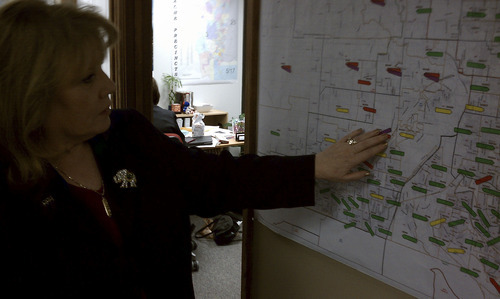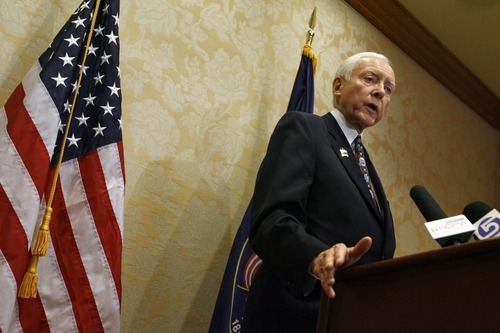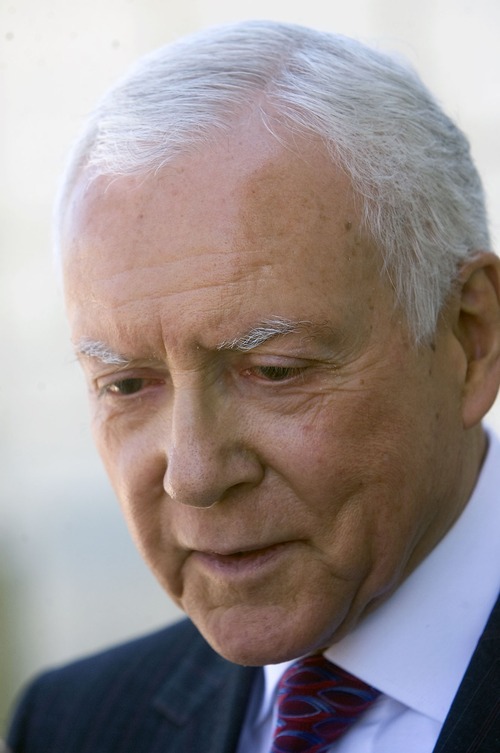This is an archived article that was published on sltrib.com in 2012, and information in the article may be outdated. It is provided only for personal research purposes and may not be reprinted.
Millcreek • At Orrin Hatch's campaign headquarters, a half-dozen volunteers were hunched over phones Wednesday night, putting the finishing touches on what has been the most exhaustive and expensive delegate recruitment effort in Utah political history.
The effort spanned more than a year and entailed contacting more than 100,000 Republicans around the state and identifying thousands of the most die-hard supporters of the die-hard senator and ensuring they turn out to their GOP caucuses Thursday evening.
"No campaign has ever spent this much time and this much resources to accomplish what we have accomplished," said Hatch campaign manager Dave Hansen.
The fate of the 36-year senator, fighting like a pit bull for his political survival, hinges on the success of the effort.
His challengers are betting all the effort will be for naught and that Utah Republicans are ready for a change.
"Orrin Hatch has spent more money to try to influence the delegate process than any candidate in the history of the state, but I don't think that delegates can be bought and I don't think the process can be manipulated like that," said Dan Liljenquist, a former state senator challenging Hatch.
Hatch's opponents haven't had the millions of dollars to go toe-to-toe with the incumbent senator. So it will take hard work and organizing Utahns ready for a change, Liljenquist said by phone, on his way to his 93rd public meeting.
"There are people all over the state who are ready for change and that's how you combat it," he said. "We've seen a groundswell of support for us, people who are old and young and say 36 years is enough."
The 4,000 delegates chosen at Republican caucuses Thursday evening will gather in April to vote for a GOP Senate nominee. If a candidate gets 60 percent support, he will win the nomination; if not, the top two vote-getters will be on the ballot in the June primary.
In 2010, Republican delegates who were fed-up with Washington and wanting a change ousted Hatch's colleague, Sen. Bob Bennett, at the Republican convention — the first time in 70 years a sitting Utah senator had lost his party's nomination.
It was a clear warning sign to Hatch.
Indeed, a Tribune poll of the current pool of delegates conducted in 2010 found that just 19 percent wanted Hatch re-elected for another term while 71 percent were ready for a change.
So the Hatch campaign began calling Utah Republicans in February 2011, reaching out to current and former delegates, recent and past attendees, and even those who hadn't been to a convention, but were identified as likely targets.
Hundreds of thousands of phone calls were made, according to Kitty Dunn, Hatch's field director. Each Republican was rated on a scale from one to five, with one for the most ardent Hatch supporters, five the most devout opponents. In each case, key issues were also identified, so the campaign could tailor a pitch to those it needed to win over.
Hatch has personally called hundreds who were on the fence.
In each of the nearly 2,000 precincts around the state, loyalists were identified to run for delegate spots, and trained for months on the caucus process and how to advocate for the senator, Dunn said. Opponents were targeted to be replaced.
"All told, we have over 5,000 who have agreed to be state delegates," said Dunn. "So do the math. For example, if we only get half elected" Hatch would still reach the 40 percent threshold and make it to a primary.
Tens of thousands of other Hatch backers were recruited to attend the Thursday caucuses and help Hatch delegates get elected.
"I think the critical thing we have done and tried to do better is made sure that not only people will show up to be a delegate, but they'll have support at the precinct level," said Dunn.
At the campaign headquarters, maps taped to the wall have color-coded arrows pointing to each precinct — green for precincts where Hatch has its quota of delegates; red where they have fallen short. Spreadsheets taped alongside chart the progress in each locality.
On some level, every campaign tries to get their supporters to the caucuses. Groups like FreedomWorks, which has spent more than $600,000 to try to defeat Hatch, have also been recruiting delegates to attend their caucuses and training them on how to get elected.
But Kirk Jowers, director of the Hinckley Institute of Politics at the University of Utah, said no campaign has ever gone to the level of detail as the Hatch campaign.
"What Hatch has done that's so unique and so expensive is essentially trying to have a much bigger impact on who the delegates will be, [waging] thousands of mini elections around the state on Thursday," Jowers said. "Hatch essentially … expanded the potential pool of [delegates] 20-fold, and so the complexity and cost just go up exponentially."
The Hatch campaign had spent $3.3 million through the end of the year and has spent hundreds of thousands more since.
Other campaigns have said that the Hatch campaign is so expansive that they have struggled to do their own delegate recruitment.
Dunn makes no apologies for the expense.
"If you're going to do your job right, you do it right, and that meant getting the funding to take on this massive project," she said. "It isn't buying it. No delegate is going to vote for the senator because we have a bigger campaign. But they will vote for him because we got the message to them."
Once the precinct elections wrap up Thursday evening, those the Hatch campaign have recruited will start reporting back whether they won or lost.
By sometime the next day, Hansen said, the campaign should have a reasonably clear picture of Hatch's political future and whether the grand plan has paid off.
Twitter: @RobertGehrke —
Online
O Find more about the caucus and other political information. › sltrib.com







